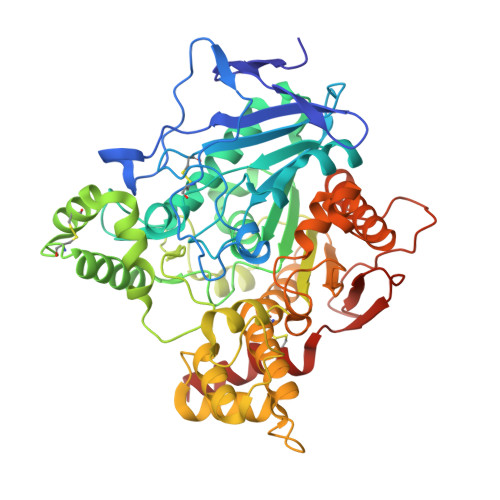Torpedo californica acetylcholinesterase is stabilized by binding of a divalent metal ion to a novel and versatile 4D motif.
Silman, I., Shnyrov, V.L., Ashani, Y., Roth, E., Nicolas, A., Sussman, J.L., Weiner, L.(2021) Protein Sci 30: 966-981
- PubMed: 33686648
- DOI: https://doi.org/10.1002/pro.4061
- Primary Citation of Related Structures:
7B2W, 7B38, 7B8E - PubMed Abstract:
Stabilization of Torpedo californica acetylcholinesterase by the divalent cations Ca +2 , Mg +2 , and Mn +2 was investigated. All three substantially protect the enzyme from thermal inactivation. Electron paramagnetic resonance revealed one high-affinity binding site for Mn +2 and several much weaker sites. Differential scanning calorimetry showed a single irreversible thermal transition. All three cations raise both the temperature of the transition and the activation energy, with the transition becoming more cooperative. The crystal structures of the Ca +2 and Mg +2 complexes with Torpedo acetylcholinesterase were solved. A principal binding site was identified. In both cases, it consists of four aspartates (a 4D motif), within which the divalent ion is embedded, together with several water molecules. It makes direct contact with two of the aspartates, and indirect contact, via waters, with the other two. The 4D motif has been identified in 31 acetylcholinesterase sequences and 28 butyrylcholinesterase sequences. Zebrafish acetylcholinesterase also contains the 4D motif; it, too, is stabilized by divalent metal ions. The ASSAM server retrieved 200 other proteins that display the 4D motif, in many of which it is occupied by a divalent cation. It is a very versatile motif, since, even though tightly conserved in terms of RMSD values, it can contain from one to as many as three divalent metal ions, together with a variable number of waters. This novel motif, which binds primarily divalent metal ions, is shared by a broad repertoire of proteins. An animated Interactive 3D Complement (I3DC) is available in Proteopedia at http://proteopedia.org/w/Journal:Protein_Science:3.
Organizational Affiliation:
Department of Neurobiology, Weizmann Institute of Science, Rehovot, Israel.















